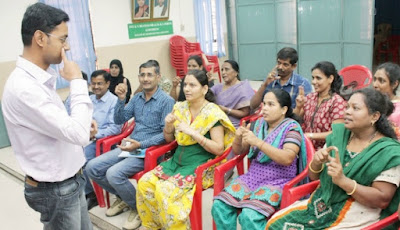The biggest challenge that the deaf community - not "deaf and dumb", just deaf - faces in India is communication. Statistics show that there are 18 million deaf people in India and only 250 interpreters. This means that there is only 1 interpreter for 72,000 people.
A new initiative is trying to fix that. Finger Chats was initiated simultaneously in Kolkata, Chennai and Bengaluru. The first event was hosted by Enable India which offers full-time courses in sign language in classrooms.
However, most of the time, before the term ends - most students have lost interest and left the class.
Rupmani Chhetri was born deaf in Nepal. She is the first of five children to her parents. She was left to care for herself. She was put in a 'regular' school with other children but she could not cope with studies. She could hear or understand her lessons and no teacher made the time to help. She was fifteen when she was able to clear Class 5. By this time, her parents had moved into Darjeeling in India with the family, for a better life.
Her siblings tried to help her but since she was the eldest, didn't know how. "As I grew older, I started spending more and more time by myself. My father stop paying for any books. I had no new clothes. I was unwanted," she tells me in rapid sign language. "That is when I started working. No one would hire me, so I went and started helping other daily wage labourers who were laying a tar road. After a day or two, they started paying me and I bought myself food."
She has not been dependent on her parents since.
Rupmani went on to learn computer typing and soon found herself in Delhi. She took up a job with Aadi - Action for Ability Development and Inclusion and has since moved up in life with her grit and experience.
Unfortunately for us, India does not have too many Rupmanis.
Most deaf children never get a real shot to realise their dreams. There are only 397 schools in India, 95 of them are in Maharashtra, for children with hearing impairment. Even in these schools, there is continued struggle to find the right teachers to train them to lead an empowered life. Another challenge is the struggle for the deaf to communicate in Indian Sign Language as opposed to American Sign Language - like Hindi versus English. The deaf need to understand both sign languages and so do the communicators!
Rajesh Menon is one of the founders of Finger Chats, a free workshop held every week to teach people to communicate in sign language. "The first event was organised by Enable India, an organisation working towards creating an inclusive society," he shares. Rupmani, attended the first event and has been a regular, helping people learn the sign language. A few more volunteers who have experiences with the challenges that the deaf face in everyday life have also come together to keep the classes going.
A small group of volunteers is managing the weekly events in the hope that even if a few people are able to complete the three-month long freestyle course they have designed, there will be another voice for the DEAF.
You can join the effort, by contributing one hour on Saturday every week for three months. Join them here.





No comments:
Post a Comment